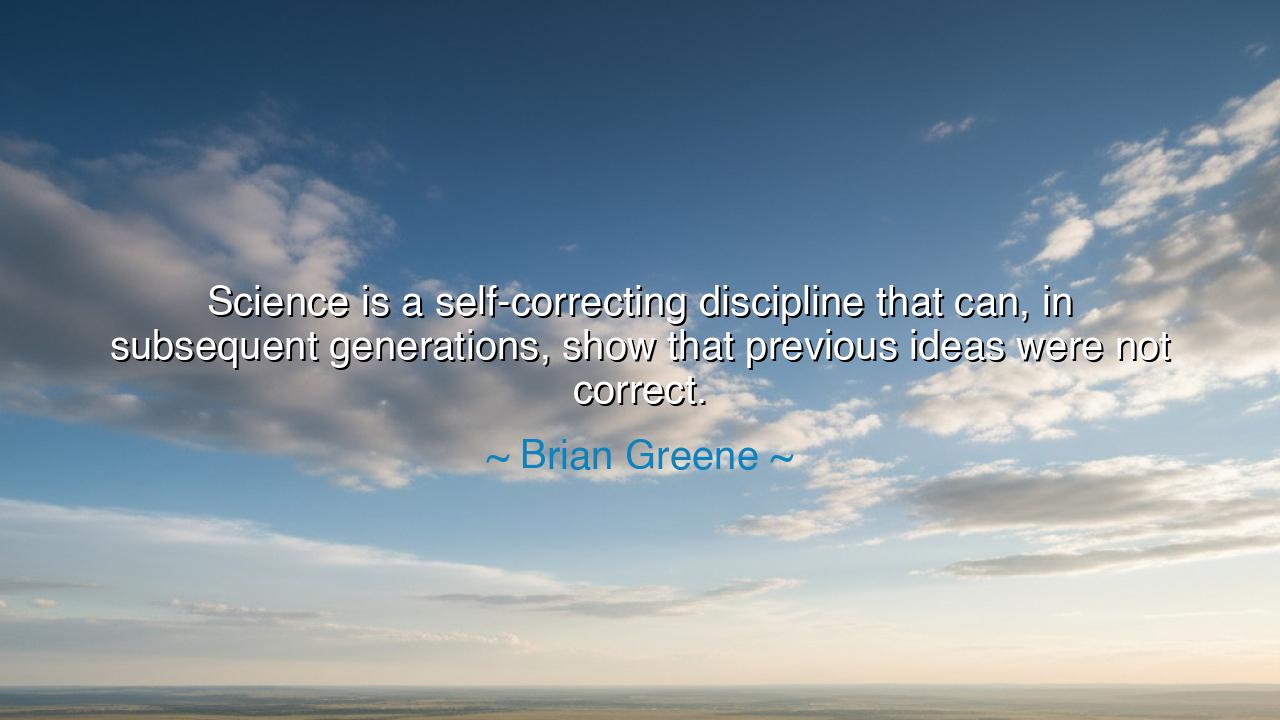
Science is a self-correcting discipline that can, in subsequent
Science is a self-correcting discipline that can, in subsequent generations, show that previous ideas were not correct.






Hear now, O seekers of wisdom, the profound words of Brian Greene: "Science is a self-correcting discipline that can, in subsequent generations, show that previous ideas were not correct." In these words, Greene reveals a central truth about the nature of science—it is a process, a journey of discovery and refinement. Science, unlike dogma, does not cling to the beliefs of the past. Instead, it embraces the reality that what is known today may one day be proven wrong, and through that very correction, humanity moves closer to truth. This is not a flaw of science, but its greatest strength—a constant evolution toward greater understanding and clarity.
In the ancient world, the great thinkers—Plato, Aristotle, and others—sought to understand the nature of existence through reason and observation. Yet even their ideas were bound by the limits of their time. Aristotle believed, for example, that the Earth was the center of the universe, a view that was held for centuries. Yet, science—in its self-correcting nature—eventually overturned this idea, as Copernicus and Galileo demonstrated the truth of a heliocentric universe. Greene’s words remind us that the pursuit of knowledge is not about clinging to fixed ideas but about accepting that truth may evolve as we gather more information and refine our methods of inquiry.
Consider, O wise ones, the story of Galileo Galilei, whose courage in advocating for the heliocentric model of the universe led to a revolutionary shift in human understanding. Galileo was not simply an observer of the heavens; he was a challenger of established thought. The Church and the scholars of his time rejected his observations because they contradicted centuries of belief. Yet, Galileo persisted, and his work laid the foundation for the scientific revolution that would follow. His story is a testament to the idea that science is not static—it moves forward, it corrects, and through this process, humanity advances. The ideas that once seemed immovable were shown, over time, to be flawed, and this shift in understanding propelled us into a new age of discovery.
Look to the works of Isaac Newton, whose laws of motion and gravity held sway for centuries. Newton’s brilliant contributions to physics were revolutionary, and for a time, they represented the peak of scientific knowledge. Yet, in the 20th century, Albert Einstein introduced his theory of relativity, showing that Newton’s understanding of gravity and space-time was incomplete. Einstein did not dismiss Newton’s work, but corrected it, offering a deeper and more accurate understanding of the universe. This process of correction, of building upon the ideas of previous generations, is the essence of what Greene speaks of. Science does not close the door on previous ideas but opens it wider, revealing more about the vast mysteries of the universe.
The story of Einstein and Newton teaches us that science is not a static body of knowledge but a dynamic, ever-evolving pursuit. Each discovery is a stepping stone, each correction a refinement that brings us closer to understanding the world and the universe. This is the very nature of science: it learns from its mistakes, embraces the humility to admit when it is wrong, and finds strength in the continuous process of self-correction. This is not to say that previous ideas were worthless, but that knowledge, like the seasons, must continue to grow, change, and mature.
The lesson for us, O seekers, is to recognize that growth and progress come not from stubbornness or pride but from the willingness to re-examine our assumptions and accept correction. Just as science moves forward through self-correction, so must we, as individuals, embrace the truth that our own ideas and beliefs may evolve over time. The most enlightened among us are not those who insist that they are right, but those who are open to learning, to evolving, and to growing through the process of discovery. Greene reminds us that science—and indeed life itself—is a journey, not a destination, and that each step forward is built on the willingness to refine and correct our understanding.
Thus, O wise ones, let us approach life with the same humility and curiosity that science embodies. Let us not fear being wrong but see it as an opportunity to correct, to learn, and to grow. Whether in our personal lives, our work, or our understanding of the world, we must embrace the power of self-correction. Just as science evolves, so too must we—constantly striving to better understand the truths that govern us, and in doing so, becoming ever closer to the wisdom that lies at the heart of the universe. In the great journey of life, it is not the final destination that defines us, but the willingness to learn, to correct, and to grow along the way.






AAdministratorAdministrator
Welcome, honored guests. Please leave a comment, we will respond soon